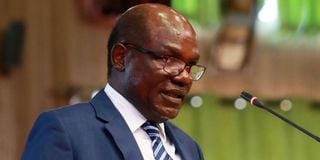Premium
President Kenyatta faulted over delay to fill vacant IEBC posts

IEBC Chairman Wafula Chebukati.
President Uhuru Kenyatta is on the spot for delaying the process of filling four vacancies at the electoral commission, almost three months since he signed an enabling bill into law.
The President’s inaction has been faulted, with a section of MPs asking him to fast-track the process.
MPs Peter Kaluma (Homa Bay Town) and Godfrey Osotsi (nominated) said that as currently constituted, the Independent Electoral and Boundaries Commission (IEBC) may not have the capacity to conduct a referendum this year to amend the 2010 Constitution as well as manage the 2022 General Election.
“The commission should be fully constituted like yesterday because the task ahead is quite difficult. We need seven members at the commission to do the job as mandated by the law, and not three,” Mr Kaluma said.
The IEBC (Amendment) Bill, 2019, was signed into law on October 28, 2020, paving the way for the President to establish a seven-member panel to recruit IEBC commissioners whenever a vacancy occurs.
The law mandates the President to set up the panel at least six months before the lapse of the term of the chairperson or member of the commission; or within 14 days of the declaration of a vacancy in the office of the chairperson or member.
Advertise vacancies
The panel shall have two men and two women nominated by the Parliamentary Service Commission, one person nominated by the Law Society of Kenya and two persons nominated by the Inter-religious Council of Kenya.
The panel has the mandate to advertise the vacancies, shortlist the names, conduct the interviews and send the list of suitable nominees to the President from where he will pick for onward transmission to the National Assembly for vetting.
The IEBC Act provides that the commission shall have seven members.
But currently, the commission has three members after four resigned in 2017 and 2018, citing strained working relationships with their chairman Wafula Chebukati.
The resignations
Ms Connie Nkatha (vice-chairperson), and members Paul Kurgat and Margaret Mwachanya resigned from the commission in April, 2018.
The resignation of the three was preceded by that of Dr Roselyn Akombe ahead of the October 26, 2017 fresh presidential election.
She said the commission was not committed to a free and fair process.
The departure of the four commissioners almost paralysed operations as at the commission in terms of quorum, with opinion divided whether the remaining three commissioners — Mr Chebukati, Mr Abdi Guliye and Mr Boya Molu — had the capacity to do the job.
Yesterday, Mr Osotsi said having appointed Ms Nkatha, Ms Mwachanya and Mr Kurgat as deputy envoys to various missions abroad last year, President Kenyatta should have started the process of refilling their positions.
“I do not know why the process has been delayed,” Mr Osotsi said.
“If anything, Parliament already did its part in formulating a framework to cure the doubt that existed in the law. We have three by-elections this year. There is a possibility of a referendum by June this year and the 2022 General Election. I don’t think the commission as presently constituted will be up to the task,” Mr Osotsi said.
Whereas the IEBC Act provides that five commissioners shall form a quorum in the plenary, a court ruling on whether the commission was properly constituted following the resignation of the four commissioners stated that it can actually transact its business.
The court order was based on the strength of Article 250 (1) of the Constitution, which states that each commission under chapter 15 of the supreme law, of which IEBC is part of, shall consist of at least three but not more than nine members.





